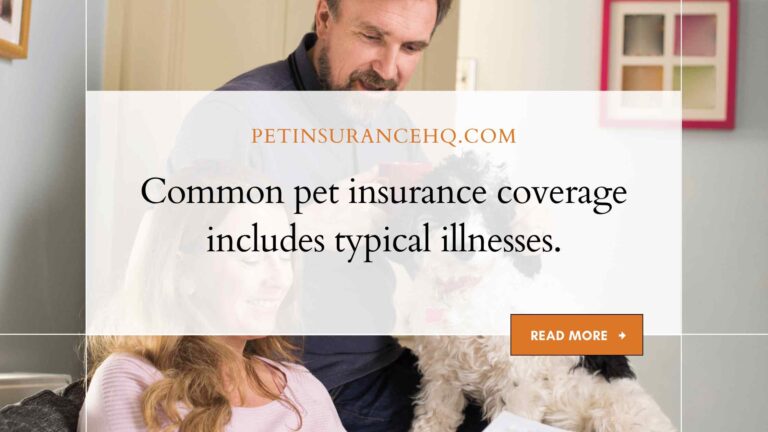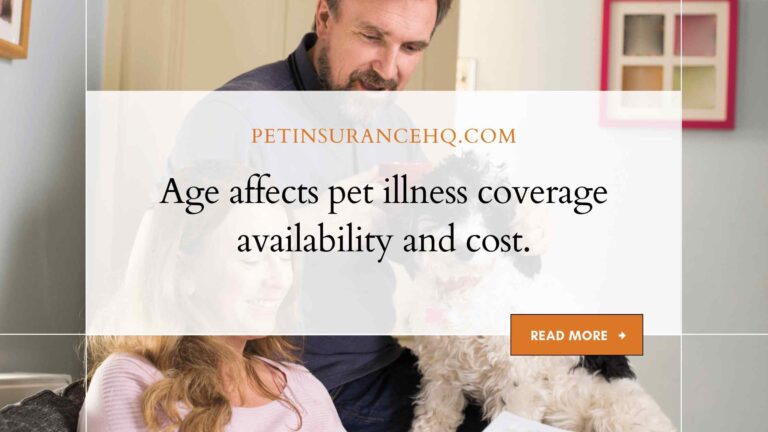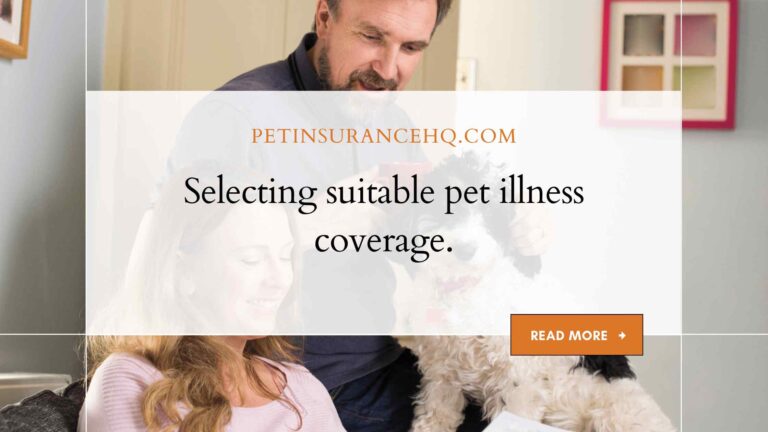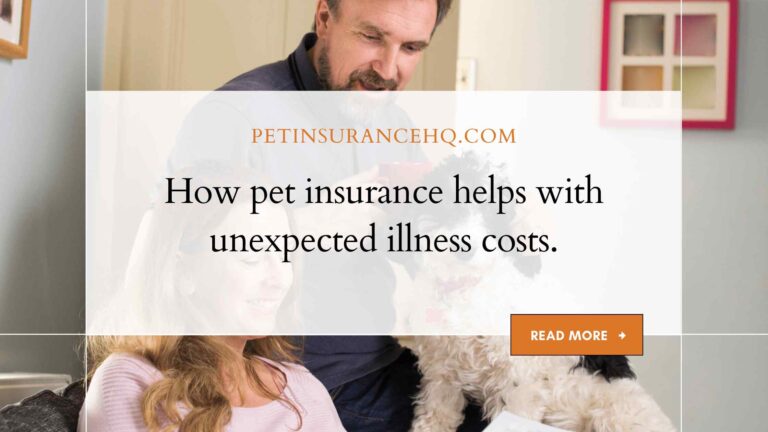What to look for in an illness coverage policy for senior pets
As pet owners, we all want the best for our furry friends. And as our pets age, it’s important to make sure they’re covered in the event of an illness or injury. But with so many options out there, how do you choose the right policy for your senior pet?
In this blog post, we’ll walk you through everything you need to know about selecting an illness coverage policy that will provide your pet with the care and protection they deserve. From key features to watch out for to common pitfalls to avoid, we’ve got you covered! So let’s dive in and explore what it takes to keep our four-legged companions healthy and happy in their golden years.
Introduction
As we age, our bodies go through changes that can sometimes lead to health problems. The same is true for our pets. As our furry friends get older, they may be more likely to develop illnesses and injuries that require medical treatment.
This is why it’s important to have an illness coverage policy for senior pets. With this type of policy, you can rest assured knowing that your pet will be covered in the event of an illness or injury.
There are a few things to look for when choosing an illness coverage policy for your senior pet. First, you’ll want to make sure that the policy covers veterinary expenses associated with the diagnosis and treatment of illnesses. Second, you’ll want to make sure that the policy has a per-incident limit that is high enough to cover the costs of most major illnesses or injuries. You’ll want to make sure that the policy includes coverage for routine care visits and preventive treatments.
By keeping these things in mind, you can choose an illness coverage policy that will give you peace of mind and financial protection in the event that your senior pet becomes ill or injured.
The Benefits of Illness Coverage for Senior Pets
As our pets age, they become more susceptible to developing serious health problems. While routine check-ups and preventive care can help catch these problems early, treatment for senior pets can be very expensive. This is where having an illness coverage policy for your senior pet can make a big difference.
An illness coverage policy can help you offset the cost of unexpected veterinary bills associated with the diagnosis and treatment of your senior pet’s health condition. Some policies will also cover the cost of diagnostic testing, hospitalization, and prescription medications.
There are many different types of illness coverage policies available, so it’s important to compare options and find one that best meets your needs. When shopping for a policy, be sure to consider the following:
- The age and health history of your pet: Some companies will not insure older pets or those with pre-existing health conditions.
- The types of coverage offered: Some policies only cover certain types of illnesses, while others may have more comprehensive coverage.
- The deductible and co-insurance: These are the out-of-pocket costs that you will be responsible for paying if your pet becomes ill. Be sure to compare deductibles and co-insurance levels across different policies to find one that fits your budget.
Having an illness coverage policy in place can give you peace of mind knowing that you’re prepared financially if your senior pet becomes sick or injured.
What to Look for in a Policy

As your pet enters his or her senior years, you may start to think about getting an illness coverage policy. Here are a few things to look for in a policy:
- Coverage for common senior pet illnesses: Look for a policy that covers common senior pet illnesses, such as cancer, arthritis, and diabetes.
- A lifetime cap on benefits: A lifetime cap means that the insurer will pay out a certain amount of money over the life of the policy, no matter how many claims you make. This is important because it means that your pet will be covered even if he or she develops a serious illness later in life.
- No pre-existing condition exclusions: Some policies exclude pre-existing conditions from coverage, which means that your pet would not be covered for an illness he or she already had when you first got the policy. Make sure to find a policy that does not have this exclusion.
- Flexible payment options: Look for a policy that offers flexible payment options, such as monthly or annual payments. This will allow you to budget for the cost of the policy over time.
Coverage Considerations
When it comes to senior pet insurance, there are a few key things to look for in order to get the best coverage for your furry friend. First, make sure that the policy covers illnesses as well as accidents. This is important because as your pet ages, they are more likely to develop chronic health conditions that will require ongoing treatment.
Second, check to see if the policy has any age limits for coverage. Some policies will only cover pets up to a certain age, so it’s important to know this in advance. Third, take a look at the deductibles and co-payments required by the policy. Higher deductibles will usually mean lower premiums, but make sure you can afford the out-of-pocket costs if your pet does need to use the coverage.
And finally, make sure you understand what is and is not covered by the policy. Pre-existing conditions are often excluded from coverage, so if your pet has any existing health problems, be sure to check with the insurer before signing up for a policy. By taking the time to understand your options and choose a policy that meets your needs, you can ensure that you and your senior pet are covered in case of an unexpected illness or accident.
Types Of Coverage Available
There are different types of coverage available when it comes to illness policies for senior pets. Some policies will cover a certain percentage of the medical bills, while others will pay out a set amount per covered incident. There are also some that will reimburse you for preventive care costs. The type of coverage you choose will depend on your budget and your pet’s needs.
The most popular options are:
- Reimbursement for veterinary care expenses. This covers a certain amount of the medical bills associated with yearly checkups, vaccinations, and treatments.
- Lifetime coverage. This type of policy will pay out whenever your pet needs medical care from any veterinarian, regardless of what the bill is. The amount could be as little as $1,000 or more.
- Preventive care coverage. This pays for preventative care such as annual checkups and vaccinations that can help keep your pet healthy and avoid expensive health issues down the line.
- Accident coverage. This pays for emergency treatments or surgeries if your pet gets injured or sick unexpectedly. It also usually includes euthanasia costs if it becomes necessary to end your pet’s suffering humanely.
- Prescription meds coverage. Some policies will help with the cost of prescription medications if they become necessary due to an existing health condition or illness.
Cost Comparison
As our pets age, they become more susceptible to illness and injury. A comprehensive pet insurance policy can help offset the high cost of veterinary care, but it’s important to compare policies to make sure you’re getting the best coverage for your needs.
When comparing pet insurance policies, look for one that covers the most common illnesses and injuries older pets experience. Cancer is a leading cause of death in dogs and cats, so coverage for this should be a top priority. Other common conditions that can be expensive to treat include diabetes, kidney disease, arthritis, and hip dysplasia.
Be sure to compare deductibles, co-pays, and reimbursement levels when shopping for a policy. A higher monthly premium may be worth it if it means you’ll have lower out-of-pocket costs when your pet needs treatment.
Read the fine print carefully before signing up for any policy. Some illnesses or treatments may not be covered, and there may be exclusions for pre-existing conditions. By understanding your coverage options before you need them, you can be sure you’re prepared financially for anything your senior pet might throw your way.
Questions To Ask Your Insurance Provider
- How much does the policy cover per illness or injury?
- What is the deductible?
- Are there any exclusions?
- How long does the policy cover an illness or injury?
- Is there a limit on how much the policy will pay out over the lifetime of your pet?
- Does the policy cover chronic illnesses?
- Does the policy have to be renewed each year?
- What is the premium?
Conclusion
Pet insurance for senior pets is a great way to make sure your furry family member gets the care they need. While it can be confusing to navigate the different policies and their coverage options, these tips should help you find the right policy for your pet. Remember, illness coverage varies from policy-to-policy so take time to read through each plan thoroughly and compare them against one another before making your final choice. From there, enjoy peace of mind knowing that if something goes wrong with your beloved pet’s health, you are covered!







